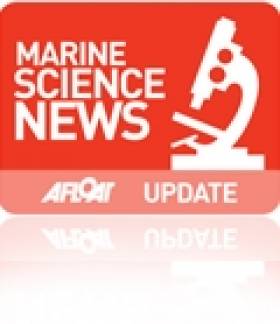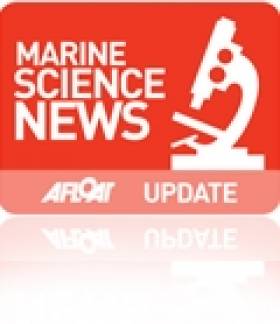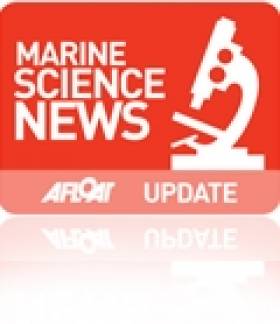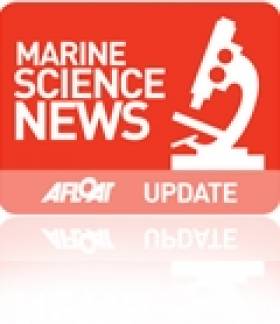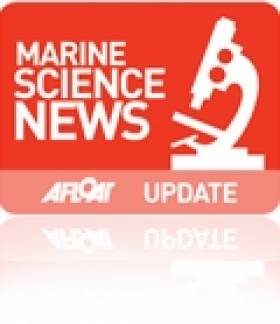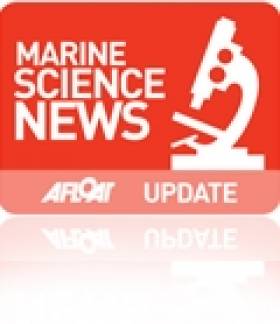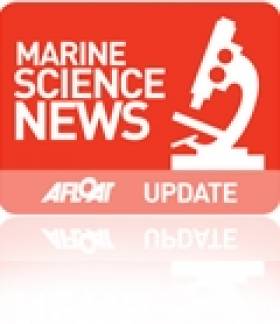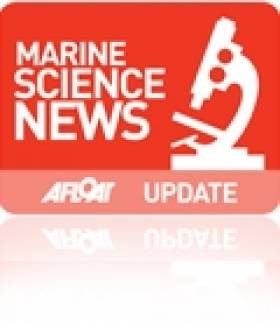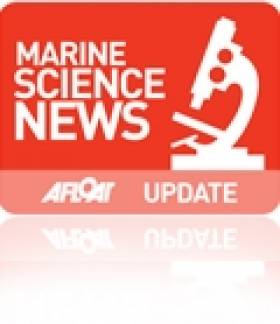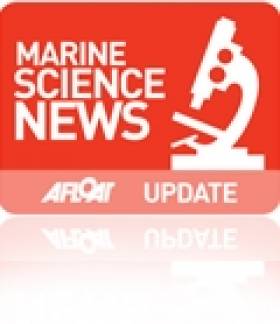Displaying items by tag: marine science
Maritime Research To Get Special Attention At Horizon 2020 Programme Launch
#Horizon2020 - The national launch of Horizon 2020, the European Union’s new €80 billion programme for research and innovation to create new growth and jobs in Europe, will take place in the Dublin Convention Centre on Tuesday 10 December.
This event is free to attend, and registration is available online at the Enterprise Ireland website.
Horizon 2020 has an increased budget of nearly 30% in real terms compared with its predecessor, the Seventh Framework Programme for Research and Technological Development (FP7).
As a result of a new strategic programming approach, 12 'focus areas' have been identified for special attention. One of these, Blue Growth: Unlocking the potential of the seas and oceans, means that marine/maritime research and innovation will receive special attention in Horizon 2020.
The areas of research that will be the focus of the first calls (2014/2015) are listed online HERE.
The EU Blue Growth Strategy (2012) recognises that seas and oceans are drivers for the European economy with great potential for innovation, economic growth and job creation. The strategy is the Integrated Maritime Policy's contribution to achieving the goals of the Europe 2020 Strategy for smart, sustainable and inclusive growth.
Implementation of the Blue Growth Strategy, including sea-basin programmes such as the EU Atlantic Action Plan (2014-2020), can be supported by EU co-funding programmes such as Structural and Cohesion Funds (eg INTERREG, Smart Specialisation), Horizon 2020 and the European Maritime and Fisheries Fund (EMFF).
The Irish marine research community, including small- and medium-sized enterprises (SMEs), benefitted greatly from FP7 (2007-2013), participating in 127 competitive and collaborative marine research projects drawing down grant-aid of over €48 million, of which 42% was shared between 39 SMEs.
This level of participation equates to circa 180 new marine science jobs in Ireland, and the figure increases to 270 jobs with the inclusion of both FP7 and INTERREG-IV marine projects over the period from 2007 to 2013.
Irish successes include MARINET (Marine Renewables Infrastructure Network for Energy Technologies), led by University College Cork, and ASIMUTH (Applied simulations and integrated modelling for the understanding of Toxic and Harmful Algal blooms), led by the Bantry-based Daithi O’Murchu Marine Research Station (DOMMRS) and which won the 2013 COPERNICUS Award for the best earth-monitoring service for European citizens.
Other projects led by Ireland include: MarineTT (European Marine Research Knowledge Transfer and Up-take of Results), led by AquaTT (Dublin); BAMMBO (Sustainable production of biologically active molecules of marine origin), led by the Limerick Institute of Technology; and CORALFISH (Assessment of interactions between corals, fish and fisheries in the deep waters of Europe and beyond), led by NUI Galway.
The Marine Institute participates in 28 projects including the strategic MyOCEAN (Development of upgraded GMES Marine Core Services) and EuroFLEETS (Towards an alliance of European Marine Research Vessel Fleets) projects.
Horizon 2020 funding is based on competitive calls that are open to everyone, including organisations and individuals from outside the EU. It is up to individual researchers, research organisations, companies or other organisations to get involved.
SMEs are encouraged to participate across the whole Horizon 2020 programme. They can engage in collaborative projects as part of a consortium, or seek support through a new dedicated SME instrument for highly innovative smaller companies.
The integrated approach and simplification efforts should lead to a minimum of 20%, or about €8.65 billion, of the total combined budgets of the specific objective 'Leadership in enabling and industrial technologies' (LEITs) and 'Societal Challenges' going to SMEs.
The SME instrument will be crucial in achieving this target. Over the course of Horizon 2020, at least €3 billion will be allocated to the SME instrument.
Full details on Horizon 2020 are included on the official Horizon 2020 website HERE.
Get Involved With 'Secchi Disk' Global Plankton Survey
#MarineScience - The team behind one of the world's biggest studies of ocean plankton have renewed their drive to encourage participation by all manner of seafarers.
As reported earlier this year on Afloat.ie, the Secchi Disk project involves the use of an special apparatus, a 30cm-wide flat white disk attached to a tape measure or rope and weighted by a small weight that's dropped off the side of a vessel.
Mariners then observe the disk as it drops, and when it disappears from view that level is known as the Secci Depth, a measure of the turbidity of the water - which in turn is influenced by the amount of microscopic marine wildlife present.
Seafarers in British and Irish waters - sailors, fishermen and yachtsmen alike - can then contribute their measurements via the Secchi App for smartphones to help researchers build a more complete picture of phytoplankton activity in our oceans and measure their changes over time.
Full details of the project and how to take part are available via the Plymouth University website HERE.
Schools Essay Contest For Celtic Explorer Visit
#MarineScience - The Marine Institute invites fifth and sixth class primary school pupils to take part in Exploring the XTRA-Ordinary, a new writing competition where the winner and their class will be invited to visit Ireland’s national maritime research vessel Celtic Explorer in Galway in early December.
Students are asked to get creative and write a poem about the XTRA-Ordinary exploration on the RV Celtic Explorer and demonstrate their understanding of Ireland’s marine life and ocean.
The winner and their class will be given a tour on board the RV Celtic Explorer and get to meet the crew and scientists that work on board, as well as see the Remotely Operated Vehicle Holland 1.
Students will also get the opportunity to visit the Dry Lab, where scientists collect data from the ocean that is used to produce maps of Ireland’s seabed, and the Wet Lab where scientists collect marine samples and research marine species that live in the ocean.
A short-list of the entries will be displayed and winners will be announced at the 2013 Galway Science and Technology Festival that takes place at NUI Galway on 24 November from 10am to 6pm.
Entries must be sent to Cushla Dromgool-Regan, The RV Celtic Explorer’s XTRA-Ordinary Writing Competition, Communications Office, The Marine Institute, Rinville, Oranmore, Co Galway. The closing date for entries is Thursday 21 November 2013.
For more information about the competition see HERE. And teachers can find lesson plans about poetry, images and footage of marine species and habitats and the activities of the RV Celtic Explorer on the Marine Institute website HERE.
In other schools news, Ayr Hill National School in Ramelton, Co Donegal took the top honour in the 'Something Fishy' education programme for 2013.
Students and staff from the school visited the Donegal Education Centre on Friday 25 October to receive their national award – won in the last two years by schools in Co Wexford - for their class project on the River Leannan and the threat posed to it by invasive species.
At the award ceremony, Ayr Hill principal Hilary McNutt was presented with the perpetual trophy by Inland Fisheries Ireland chief Dr Ciaran Byrne and a class trophy from the IFI board chair Brendan O’Mahony.
Donegal GAA player Mark McHugh was also on hand to add his congratulations and present each student with an individual ‘goodie bag’.
McNutt praised the work of her pupils, the Education Centre and IFI staff Owen Kelly and Paul Burke, whose interest and passion for their work enthused and engaged the children with the project.
The River Leannan project involved preparatory class work and the pupils visiting eight sites along the river from source to sea taking physical readings as well as looking at land use, flora and fauna and in particular watching out for ‘alien species'.
SmartOcean's Call of the Sea for Emerging Marine Tech Opportunities
SmartOcean Ireland invites ICT companies to register for the SmartOcean Forum 2013 at the Titanic Centre, Belfast, 5-6 November and join Ireland's emerging marine technology sector to develop high-tech products and services for the global marine sector.
The purpose of this all-island event is to highlight the commercial opportunities and emerging innovations of Ireland's SmartOcean Cluster. The forum, sponsored by Invest Northern Ireland, will focus on key areas such as blue growth, marine data and knowledge, renewable ocean energy, sustainable exploitation of marine resources and ocean observation.
SmartOcean, a Marine Institute led initiative, aims to establish Ireland as a leader in the development of specialist ICT products and services for global marine sectors.
Dr. Edel O'Connor, National Coordinator, Advanced Marine Technology Programme said: "We have a huge opportunity here in Ireland to translate technologies for global marine markets including traditional sectors such as fisheries, aquaculture, transport and security as well as emerging sectors such as ocean energy and environmental monitoring, and ocean observatories. We want to bring together ICT companies, large and small, in Ireland, the European Atlantic States, the US and Canada to collaborate and deliver new marine technology products and services."
Alison Gowdy, Head of Sector and Cluster Development at economic development agency Invest Northern Ireland, commented "ICT companies in Northern Ireland are enjoying global success in many areas relevant to the SmartOcean event, including wireless sensors, data analytics, mobile and wireless comms, and underwater monitoring. Invest Northern Ireland is pleased to sponsor the event which is being held in Belfast this year for the first time".
The forum will have a strong transatlantic focus building on the Galway Statement on Atlantic Ocean Cooperation signed earlier this year (23 May 2013) at the Marine Institute by EU Commissioners Maire Geoghegan Quinn and Maria Damanaki, Edward Fast for Canada and Dr Kerri-Ann Jones on behalf of the US Government.
Speakers from US, Canada, and Europe will include Dr. Gilles Ollier, Head of Sector Earth Observation, DG for Research & Innovation, European Commission, Dan Fay, Director, Earth, Energy and Environment, Microsoft Research, and Andrei Grigoriev, Senior Director Enterprise Services SAP as well as the European Space Agency,
The forum will give insights on emerging markets, policy and opportunities for innovation associated with the launch of Horizon 2020 in 2014 and will work towards achieving targets set out in Harnessing Our Ocean Wealth – An Integrated Marine Plan for Ireland.
For more information and registration visit www.smartocean.org
Register For SMARTSkills Workshop On Research Funding And Marine Data
#MarineScience - The SMARTSkills 2013 Postgraduate Workshop on Research Funding Opportunities and Marine Data Access will be held on the 24 and 25 October 2013 hosted by the Marine Institute in Oranmore, Galway.
The two-day workshop is organised by the Strategic Marine Alliance for Research and Training (SMART) and is sponsored by Galway-Mayo Institute of Technology (GMIT), and aims to support postgraduate researchers by providing practical, concise information on accessing research funding and marine data sets, two topics identified as essential for emerging marine researchers.
Day one of the workshop will focus on funding mechanisms, researcher mobility, careers and access to infrastructure and training.
Speakers are drawn from a wide range of scholarship and research organisations including the Higher Education Authority, Erasmus Mundus, AquaTT, Science Foundation Ireland, Irish University Association, Enterprise Ireland, Marie Curie, Euraxess, European Research Council and UCD Innovation Academy, along with a number of research funding programmes including Horizon 2020 and Interreg V.
The second day will address how to access and mine the huge variety of marine biological, oceanographic, environmental and ocean energy-related datasets and model outputs available.
National and International marine data experts will present on online data portals and datasets including SeaDataNet, My Ocean, PlanktonNet, EMODNet, INFOMAR, MIDA, ICAN and ICES. The topic of data management will also be examined with a focus on formatting, metadata and archiving data.
SMARTSkills will also serve as a networking and social opportunity and facilitate marine researchers in communicating their research with potential future collaborations. All attendees are therefore also requested to give a two-minute flash presentation on their research.
The workshop is open to all postgraduate students of marine science, technology and engineering from across the island of Ireland.
The SMART postgraduate workshop is free to students from all member institutes. A registration fee of €75 is payable by students from institutes not involved with the SMART consortium, although some scholarships are available.
SMART partners include: Athlone Institute of Technology (AIT); Galway Mayo Institute of technology (GMIT); Marine Institute (MI); NUI Galway (NUIG); University College Cork (UCC) and University of Ulster (UU).
All prospective attendees register online before tomorrow Friday 18 October. Registration and further information is available HERE. For any further queries contact the SMART team at [email protected].
#MarineScience - The RV Celtic Explorer is nearly a week into its Celtic Sea Herring Survey for 2013 with a wide variety of marine wildlife sightings already on record.
Some 15 scientists comprise the crew of the research vessel for the 3,200-nautical-mile voyage, including eight members of the core acoustic and biological team, plus four seabird observers, one marine mammal observer, one observer from the fishing industry and a PhD student in environmental microplastics.
The boat's first day at sea saw the crew treated to the sight of more than 50 common dolphins around the Blasket Islands and Dingle Bay, which also boasts an important concentration of seabird species such as sooty shearwaters, guillemots and storm petrels.
The latter, also known as 'stormies', are one of the hardiest bird species, especially for their tiny size - many living for up to 30 years despite the challenging conditions the face far out to sea on their migratory path to south-west Africa.
But herring stocks are the focus of this survey, and where there's herring there are whales - with multiple fin whales and at least one humpback whale spotted south of Union Hall last Thursday 10 October.
For more updates from the Celtic Explorer crew follow their Scientists@Sea blog HERE.
Seabed Survey Seminar Tries To Bridge Gap Between Research And Industr
#INFOMAR - The annual INFOMAR Seminar on one of the world’s largest seabed mapping programmes took place this week at the University of Limerick from 9-10 October, with updates on Ireland’s national seabed mapping programme.
Archie Donovan of the Geological Survey of Ireland highlighted INFOMAR’s recent mapping achievements saying: “We have made significant progress towards the delivery of national targets identified in our national integrated marine plan, Harnessing Our Ocean Wealth, and supporting ocean energy, marine tourism, environment, and shipping and trade development and management.”
A key focus of the conference is to bridge the gap between research and industry and the potential for innovation, research, and business opportunities from the mapping data and activities.
Among the SMEs presenting their innovations in this area were Gavin Duffy of RealSim Ltd, who presented their mapping and visualisation technology, and Francis Flannery of SonarSim Ltd who spoke about the benefits of multidisciplinary research collaboration from an SME perspective.
“There are significant scalable commercial opportunities relating to INFOMAR supported technology outputs, linking industry needs to research applicationsm," said the Marine Institute's Tommy Furey.
"The programme has already generated industry partnerships, for example, Geomar and Highland Geosolutions, and there are global opportunities for Ireland to deliver marine technology solutions, leveraging the internationally recognised INFOMAR brand."
A session on ‘Mapping Requirements & Mapping Technologies’ included a presentation on the need for mapping of Ireland’s vast and valuable seaweed resources by Dagmar Stengel of NUI Galway.
Tim McCarthy of NUI Maynooth examined the use of unmanned autonomous vehicles in seabed mapping as well as the challenges that brings.
The seminar hosted by the Mobile & Marine Robotics Research Centre included a presentation by Dr Andy Wheeler of UCC about the Moytirra Vent, a new type of hydrothermal vent, discovered onboard the national research RV Celtic Explorer in 2011 by a team of Irish and international scientists.
There was also an update on the mapping of shipwrecks and collaboration between the Underwater Archaeology Unit and the INFOMAR Programme, as well as a look at the investigation of INFOMAR-mapped shipwrecks by divers on the North Coast of Ireland.
INFOMAR is a joint venture between the Geological Survey of Ireland and the Marine Institute, and follows on from the Irish National Seabed Survey.
Covering some 125,000 sq km of Ireland's most productive and commercially valuable inshore waters, INFOMAR will produce integrated mapping products covering the physical, chemical and biological features of the seabed, and has prioritised the surveying of 26 bays and three priority areas around the coast of Ireland.
For more information visit www.infomar.ie
Inland Fisheries Ireland Extends Research Partnership With UCD
#MarineScience - Inland Fisheries Ireland (IFI) and University College Dublin (UCD) jointly sealed a Memorandum of Understanding at UCD’s Ardmore House on Monday 7 October expressing their commitment to a continued rich and productive liaison in research.
Over the past 50 years, scientists from UCD and the fisheries service have worked in collaboration in producing research that has covered an extraordinary range of projects – from aquatic plant to macro-invertebrate and fish stock studies.
In recent years the boundaries have expanded even further with collaborative micro-satellite DNA studies of fish stocks being undertaken.
“With the current limited public purse, this agreement will ensure a greater degree of symbiosis between these two organisations resulting in increased productivity, avoidance of duplication and strategically focused research,” said Minister of State Fergus O’Dowd, who presented both bodies with commemorative plaques to mark the occasion.
“It is my hope that this academic research, when coupled with applied research and practical application, will serve to increase our understanding on the inland fisheries resource though the use of novel technologies like DNA, environmental DNA and the development of bio-controls.”
The minister went on to stress the importance of the MOU in providing graduates and postgraduate with exposure to applied science and an opportunity to contribute to our understanding of the freshwater resource and to support its management, conservation and protection.
IFI’s head of research Dr Cathal Gallagher said: “I am confident that the MOU signed here today will act as an impetus to move forward with future collaboration in development of research techniques and projects to support the conservation and development of the natural resource that is inland fisheries.
“I see a vital role for IFI in supporting the development and education of the next generation of scientists into whose hands the future of this resource will be placed and I wish to acknowledge the great work undertaken by those who have brought us to where we are today – management of fisheries on the basis of sound science.”
Dr Mary Kelly-Quinn of UCD’s School of Biology and Environmental Science added that the MOU “will provide great opportunity for collaborative research with an industry partner. Our students will benefit enormously from unrivalled training in applied research and interaction with senior scientists dealing with emerging issues in aquatic and fisheries science.
“More so than ever before we appreciate the importance of building linkages with industry to ensure that we produce graduates that are able to enter the workforce and contribute to economic recovery through sustainable use of our countries resources.
“Today’s announcement is a step towards a greater goal which sees the development of a Centre for Fisheries Research here in UCD with the support of IFI.”
Allianz Business to Arts Award for Marine Institute
#marineinst – Organisations ranging from the corporate sector, small businesses, State agencies and a wide selection of artists and cultural groups from around Ireland gathered at Bord Gáis Energy Theatre in Dublin last week (Tuesday 10th September) to celebrate the 2013 Allianz Business to Arts Awards.
Arts Minister Jimmy Deenihan presented ten awards to organisations who had achieved excellence in their collaborations with developing business and arts partnerships, sponsorships and commissions, as well as cultural entrepreneurship.
The MC for the evening, Aine Lawlor and other speakers including Stuart McLaughlin, CEO of Business to Arts; Brendan Murphy, CEO of Allianz; and Minister for Arts, Heritage and the Gaeltacht, Jimmy Deenihan TD, all highlighted the consequence of how the arts and culture play an important role in creating a healthy society and a strong community in which to do business both nationally and internationally.
The Marine Institute and the Galway choir group Cois Claidagh were awarded highly commended for their collaboration in presenting The Longest River – an arts, ocean literacy and music event in Brussels earlier this year.
The Longest River promotes marine science and technology through choral music, a selection of poetry, narration, lecture, as well as marine photography and high definition video footage of the deep sea and future technologies. This performance enabled the Institute to highlight the importance of multidisciplinary marine research and how working across international borders is essential in achieving healthy marine ecosystems. A short clip of The Longest River performance can be seen on You Tube.
Marine Institute Heads New Advances In Shellfish Science
#MarineScience - The Marine Institute has headed a major international project demonstrating the latest advances in shellfish safety.
Results of this four-year project - presented on Tuesday 10 September at the ASTOX-II Project workshop in the Oranmore HQ of the Marine Institute – were described as very significant for the shellfish industry, and for the institute's key position in the field of marine biotoxin science.
According to researchers, new discoveries made during the project regarding the biological source, chemistry and toxicology of a naturally occurring marine biotoxin Azaspiracid will lead to a better understanding and regulation of the problem.
This toxin is regulated under EU law and can accumulate in shellfish resulting in closures of shellfish production areas in order to prevent human illness.
Irish scientists have worked on understanding the nature and origin of the toxin since it was first discovered on the west coast of Ireland in the mid 1990s.
An international group of over 40 world-leading scientists in the field of biotoxin science who attended the workshop described several practical tools that have been developed for the analysis of this toxin and its micro algal source.
The group also described several new phytoplankton species responsible for producing the toxins, developed new molecular probes and other assays for monitoring the problem, and for the first time produced details of how the toxin affects consumers during and following digestion.
These answers are essential in setting appropriate shellfish safety standards to ensure that only the highest quality Irish shellfish reach the market, said the Marine Institute.
Another major output of the project was the purification of several Azaspiracid variants directly from Irish shellfish and micro algae for use as certified reference materials. These ultra-pure extracts are essential for analytical techniques and are now distributed to monitoring and research labs all over the world.
“The success of this project is very important for food safety in Ireland and internationally but also for the Irish shellfish industry,” said project manager Jane Kilcoyne of the Marine Institute. “When a bay is closed for shellfish production because of a harmful algal bloom it can cause severe economic hardship for producers in that area.
"We hope the practical tools developed through this project for example new rapid test methods will help to minimise the impact of these harmful toxins on shellfish producers by providing better prediction and monitoring systems.”
The ASTOX-II project team of Irish, Northern Irish, French, Norwegian, American, Canadian and German scientists worked together on biological, chemical and toxicological aspects of the compound. Since the project began it has generated many publications – including three PhD studies, 29 peer-reviewed papers, three book chapters and 44 presentations at national and international conferences - and others are anticipated after its completion in November 2013.
These publications stimulate global interest in Azaspiracid research, disseminate new knowledge and reinforce Ireland’s position as a leading performer in marine toxins research. This knowledge continues to enable the development of national and international policy, which supports the development of Ireland’s seafood sector.
Speaking after the event, Marine Institute CEO Peter Heffernan congratulated the scientific team. “This project has brought together a unique team of Irish and international scientists who are among the world leaders in their field of ocean environment biotoxin analyses and draw from the experience of leading marine and food safety organisations in the world whose combined efforts have significantly advanced scientific knowledge in this field,” he said.
The project is carried out under the Sea Change strategy with the support of the Marine Institute and the Marine Research Sub-programme of the National Development Plan 2007–2013, co-financed under the European Regional Development Fund.
The workshop - which followed on from the 10th annual Shellfish Safety Science workshop in Galway earlier this year - continued yesterday (11 September) with a seminar hosted by Agilent Technologies focusing on monitoring of environmental pollutants and toxins using an advanced analytical technique used by the Marine Institute called mass spectrometry.
More information is available in the project brochure and leaflet, both available to read and download as PDFs.


























